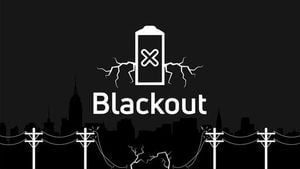A massive power outage struck the Iberian Peninsula on April 28, 2025, leaving millions without electricity across Spain, parts of Portugal, and regions of southern France. The blackout, described as unprecedented, affected daily life significantly, causing chaos in major cities and prompting widespread speculation about its causes.
The outage began around midday, with the French network operator RTE reporting that the Iberian power grid was automatically disconnected from the European network at 12:38 PM. By late evening, approximately 1.7 million people in Portugal were still without power, and the situation was dire in Spain, where the blackout extended from the north to the south of the country.
In response to the crisis, Spanish Prime Minister Pedro Sánchez addressed the nation, urging calm and advising citizens to limit their use of mobile phones to essential calls only. "Until the power supply is restored, we will experience some critical hours," he said during a televised speech. Sánchez emphasized the importance of not overloading emergency lines and encouraged people to stay informed through official channels.
As the night progressed, celebrations erupted in cities like Madrid when power was gradually restored. Residents cheered, sang, and expressed their relief as lights flickered back on after nearly nine hours of darkness. The jubilant cries of "Siii" (Yes) and "Vivaaa!" (Hooray) echoed through the streets of the capital, particularly in neighborhoods such as Chamberí.
Despite the eventual restoration of power, the aftermath of the blackout was severe. School was canceled in major cities like Madrid, and train services were suspended until further notice. The entire rail network in Spain had come to a standstill, stranding countless passengers in trains, subways, and elevators. Reports indicated that many tourists found themselves trapped at airports, leading to frustration and confusion.
In Portugal, the situation was similarly grim, with the Portuguese Prime Minister Luís Montenegro indicating that the outage was a result of disturbances in the Spanish power grid. He stated that while the power supply was expected to return to normal during the night, the complete restoration might take longer due to the complexity of the situation.
As investigations into the cause of the outage unfolded, speculation arose regarding potential sabotage. Some commentators suggested that Russia might be involved, given the geopolitical tensions in Europe. However, EU Council President António Costa stated that there was no evidence to support claims of a cyberattack. The Spanish national cybersecurity institute was nonetheless looking into the possibility of a hack being behind the outage.
Adding to the confusion, the Portuguese network operator REN pointed to a "rare atmospheric phenomenon" as a possible cause for the disruption. This was echoed by Kristian Ruby, head of the European electricity industry association Eurelectric, who noted that issues with the power connection between France and Spain may have contributed to the blackout.
The Spanish government convened the National Security Council to address the crisis, and authorities raised alert levels in several autonomous regions. In eight regions, including Madrid, Andalusia, and Valencia, the central government temporarily took over administration to facilitate logistical support and ensure that essential services were restored swiftly.
As the power began to come back online, the Red Eléctrica operator reported that over 90 percent of the supply had been restored by Tuesday morning, April 29, 2025. However, they cautioned that the complete normalization of the grid could take up to a week due to the complexity of the issues at hand.
The blackout had far-reaching effects on public life. Hospitals switched to emergency protocols, canceling non-urgent procedures and relying on backup generators. Many residents reported panic buying, particularly bottled water, as electric pumps in homes failed, leaving them without running water. Videos emerged on social media of long lines outside supermarkets, while people shared their experiences of being trapped in elevators or stuck on public transport.
In the wake of the outage, the Spanish government faced criticism for its handling of the situation. Many citizens expressed frustration over the lack of clear communication and information during the crisis. Social media erupted with complaints, and the hashtag #apagón (blackout) trended as people shared their experiences and frustrations.
As the situation improved, the Spanish Ministry of Health reassured the public that hospitals had reserve systems in place to ensure continued care. However, the event raised questions about the resilience of the power infrastructure in Spain and its ability to withstand such disturbances.
In conclusion, the massive power outage on the Iberian Peninsula highlighted vulnerabilities in the region's electricity grid and sparked a wave of speculation about its causes. As investigations continue, the immediate focus remains on restoring normalcy and addressing the fallout from this unprecedented event.






